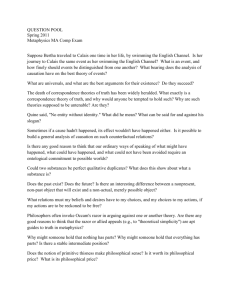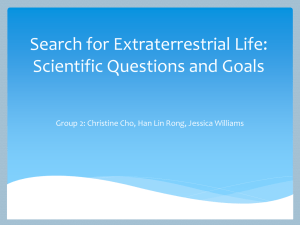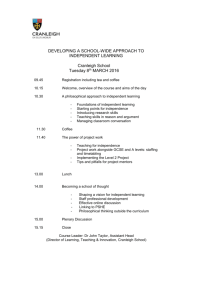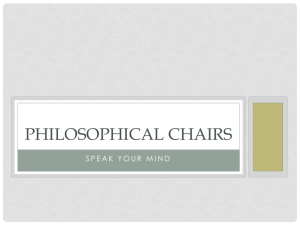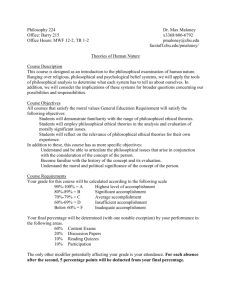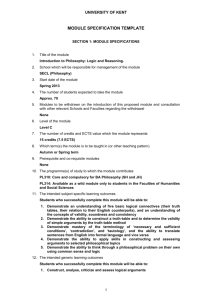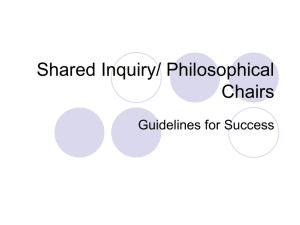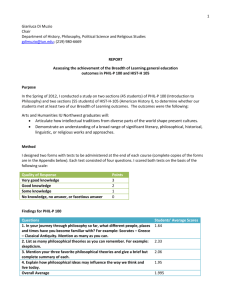Educational Theory and Philosophical
advertisement
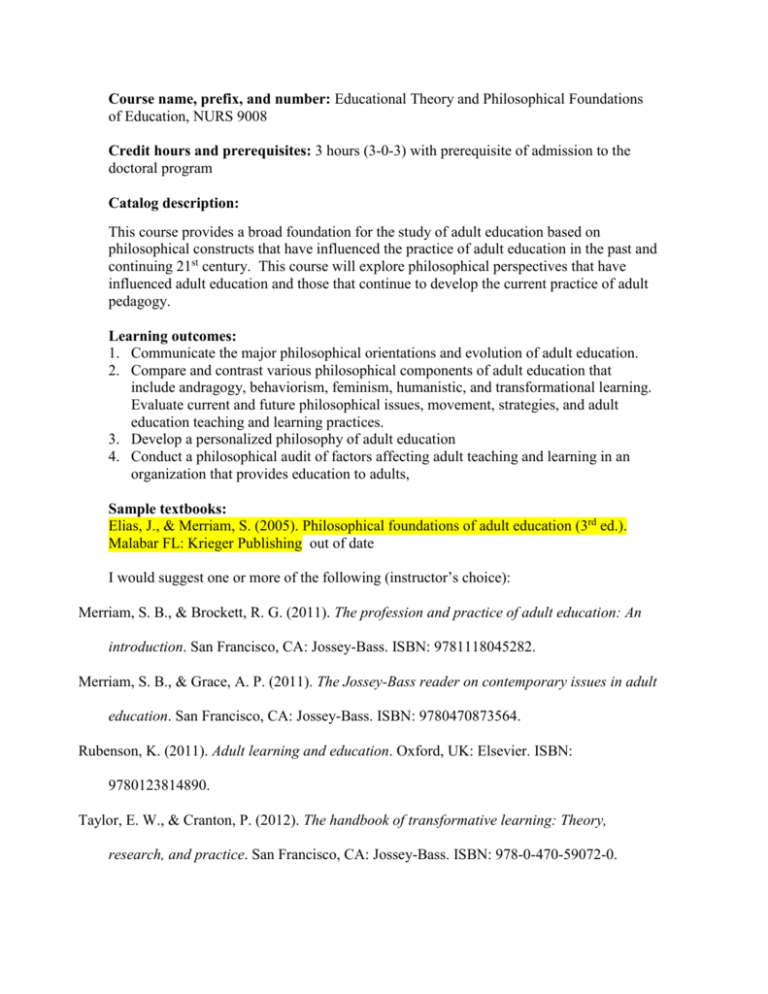
Course name, prefix, and number: Educational Theory and Philosophical Foundations of Education, NURS 9008 Credit hours and prerequisites: 3 hours (3-0-3) with prerequisite of admission to the doctoral program Catalog description: This course provides a broad foundation for the study of adult education based on philosophical constructs that have influenced the practice of adult education in the past and continuing 21st century. This course will explore philosophical perspectives that have influenced adult education and those that continue to develop the current practice of adult pedagogy. Learning outcomes: 1. Communicate the major philosophical orientations and evolution of adult education. 2. Compare and contrast various philosophical components of adult education that include andragogy, behaviorism, feminism, humanistic, and transformational learning. Evaluate current and future philosophical issues, movement, strategies, and adult education teaching and learning practices. 3. Develop a personalized philosophy of adult education 4. Conduct a philosophical audit of factors affecting adult teaching and learning in an organization that provides education to adults, Sample textbooks: Elias, J., & Merriam, S. (2005). Philosophical foundations of adult education (3rd ed.). Malabar FL: Krieger Publishing out of date I would suggest one or more of the following (instructor’s choice): Merriam, S. B., & Brockett, R. G. (2011). The profession and practice of adult education: An introduction. San Francisco, CA: Jossey-Bass. ISBN: 9781118045282. Merriam, S. B., & Grace, A. P. (2011). The Jossey-Bass reader on contemporary issues in adult education. San Francisco, CA: Jossey-Bass. ISBN: 9780470873564. Rubenson, K. (2011). Adult learning and education. Oxford, UK: Elsevier. ISBN: 9780123814890. Taylor, E. W., & Cranton, P. (2012). The handbook of transformative learning: Theory, research, and practice. San Francisco, CA: Jossey-Bass. ISBN: 978-0-470-59072-0. Topics for class sessions: Philosophical Orientations and Challenges Postmodernism and Adult education Analytic Philosophy of Adult Education Liberal Adult Education Behaviorist Adult Education Humanistic Adult Education The Influence of Feminist Theory Transformational Learning Theory Lifelong Learning suggested additional topic Generic assignments/methods of evaluation: A. Weekly Discussions and or Chats-10% B. Organizational Philosophy audit-20% C. Collaborative Essay – Current and Emerging Philosophical Challenges in Adult Education-35% D. Personal Adult Education Philosophy-10% E. Integration of Course Concepts-25% Grading System: A = 90 – 100 B = 80 – 89 C = 75 – 79 F = below 75 No course in which a student receives a C grade can be applied to education (Ed.D.) or psychology (Psy.D.) doctoral degree programs of study. February 24, 2011 Last updated September 26th, 2012 by Jack Yensen Revised Version Course name, prefix, and number: Educational Theory and Philosophical Foundations of Education, NURS 9008 Credit hours and prerequisites: 3 hours (3-0-3) with prerequisite of admission to the doctoral program Catalog description: This course provides a broad foundation for the study of adult education based on philosophical constructs that have influenced the practice of adult education in the past and present. This course will explore philosophical perspectives that have influenced adult education and those that continue to develop the current practice of andragogy. Learning outcomes: 5. Communicate the major philosophical orientations and evolution of adult education. 6. Assess various philosophical components of adult education that include andragogy, behaviorism, feminism, humanistic, and transformational learning. 7. Evaluate contemporary philosophical issues, movement, strategies, and adult education teaching and learning practices. 8. State a personalized philosophy of adult education 9. Complete a philosophical audit of factors affecting adult teaching and learning in an organization that provides education to adults, Sample textbooks: Merriam, S. B., & Brockett, R. G. (2011). The profession and practice of adult education: An introduction. San Francisco, CA: Jossey-Bass. ISBN: 9781118045282. Merriam, S. B., & Grace, A. P. (2011). The Jossey-Bass reader on contemporary issues in adult education. San Francisco, CA: Jossey-Bass. ISBN: 9780470873564. Rubenson, K. (2011). Adult learning and education. Oxford, UK: Elsevier. ISBN: 9780123814890. Taylor, E. W., & Cranton, P. (2012). The handbook of transformative learning: Theory, research, and practice. San Francisco, CA: Jossey-Bass. ISBN: 978-0-470-590720. Topics for class sessions: Philosophical Orientations and Challenges Postmodernism and Adult education Analytic Philosophy of Adult Education Liberal Adult Education Behaviorist Adult Education Humanistic Adult Education The Influence of Feminist Theory Transformational Learning Theory Lifelong Learning Generic assignments/methods of evaluation: F. Weekly Discussions and or Chats-10% G. Organizational Philosophy audit-20% H. Collaborative Essay – Current and Emerging Philosophical Challenges in Adult Education-35% I. Personal Adult Education Philosophy-10% J. Integration of Course Concepts-25% Grading System: A = 90 – 100 B = 80 – 89 C = 75 – 79 F = below 75 No course in which a student receives a C grade can be applied to education (Ed.D.) or psychology (Psy.D.) doctoral degree programs of study. February 24, 2011 Last updated September 26th, 2012 by Jack Yensen

